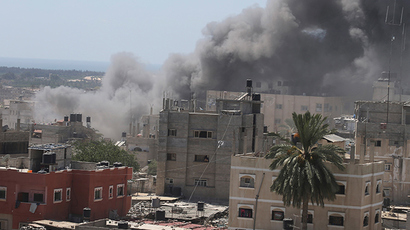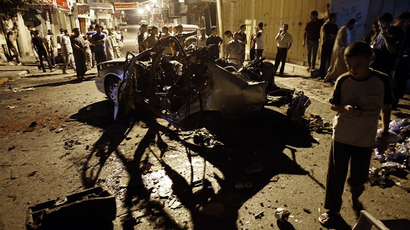Gaza healthcare services on brink of collapse as death toll climbs
Healthcare services in Gaza are on the brink of collapse as the death toll climbs amid a shortage of medical supplies and fuel for hospital generators, the WHO has warned. Ninety Palestinians have been killed so far, according to the Gaza Health Ministry.
Follow RT's LIVE UPDATES on Israeli military offensive in Gaza
As Israel escalated its airstrikes on Thursday, the Gaza Health Ministry reported that the death toll had reached 90 people, while the number of injured had climbed to 500.
Meanwhile, the World Health Organization (WHO) said on Thursday that Palestinian healthcare services are not able to handle the wave of people requiring medical attention.
"A hospital, three clinics and a water desalinisation centre in a refugee camp have also been damaged. More air strikes and missile attacks are likely," the WHO said in a statement.
"The recent escalation of violence in the Gaza Strip raises concern about the ability of the government and the Ministry of Health of the occupied Palestinian territory to cope with the increased burden of medical emergencies on the health system, given the high levels of shortages of medicines, medical disposables and hospital fuel supplies, and rising healthcare debt," it added.
The organization is calling on donors to contribute $40 million for essential healthcare supplies by the end of 2014 and another $20 million to repay the debt owed to East Jerusalem hospitals.

US willing to facilitate ceasefire
Meanwhile, international pressure has been increasing for both Israel and Hamas to deescalate the conflict.
US President Barack Obama told Israeli Prime Minister Benjamin Netanyahu that Washington is willing to negotiate a ceasefire between Israel and Hamas.
Speaking to the Israeli leader on Thursday, Obama condemned the rockets fired from Gaza and said that Israel has the right to self-defense. However, he also urged both sides not to escalate the crisis and to restore calm.
"The United States remains prepared to facilitate a cessation of hostilities, including a return to the November 2012 ceasefire agreement," said the statement.
Russian President Vladimir Putin urged Netanyahu to end the bloodshed immediately in a telephone conversation on Thursday, expressing concern over civilian casualties. UN chief Ban Ki-moon also called for an immediate ceasefire at an emergency meeting of the Security Council.

Earlier on Thursday, the UN confirmed that the Palestinian death toll had risen to 88 as Israel's Operation Protective Edge continued for a third day. At least 18 children have been killed in the Gaza Strip since the operation began.
Despite the mounting number of civilian deaths, the IDF claims that its military operation does not target the people of Gaza.
“This is not an operation in any capacity against the people of Gaza. This is an operation against Hamas, against organization that purposefully and specifically uses the civilian population of Gaza as human shields,” IDF spokesperson Libi Vice told RT.
Vice said the IDF is taking various precautions to protect the civilian population of Gaza.
“We made unbounded efforts to protect the civilian population in the Gaza Strip before any attack is taking against Hamas. We take measures that no other military or no other country take in the world, which include text messages to people in civil areas, phone calls to their homes.”
The damage to the Gaza Strip has been devastating, said journalist Harry Fear, who is reporting for RT from Gaza.
“Among the civilian population at large, hundreds of homes have been destroyed. And from the north to the south of the Gaza Strip, there has been aerial, naval, and land bombardment since the operation began,” he said.
Fear added that what remains to be seen is whether Israel will begin a ground operation as well, on top of the airstrikes. “The key question is whether or not there is likely to be ground escalation. Israeli military officials have eluded to the possibility of this. Whether or not this is just preparedness or actual strategy in the upcoming days is yet to be seen.”
The International Committee of the Red Cross (ICRC) has called on Israel and Hamas to protect the lives of civilians and medical workers.
"The human impact of this vicious circle of armed violence is worsening by the hour," Jacques de Maio, head of the ICRC delegation in Israel and the occupied territories, said on Thursday. "Civilians must be protected. In all cases, ambulances, hospitals and medical workers must be ensured the conditions of safety they require to carry out their vital work.”
The organization also condemned the attack on the Palestine Red Crescent branch in Jabaliya, where a dozen staff members and volunteers were wounded and three ambulances destroyed on July 9.
Read more: 9 killed while watching World Cup as Israeli missile
hits Gaza beach café (VIDEO, PHOTOS)














